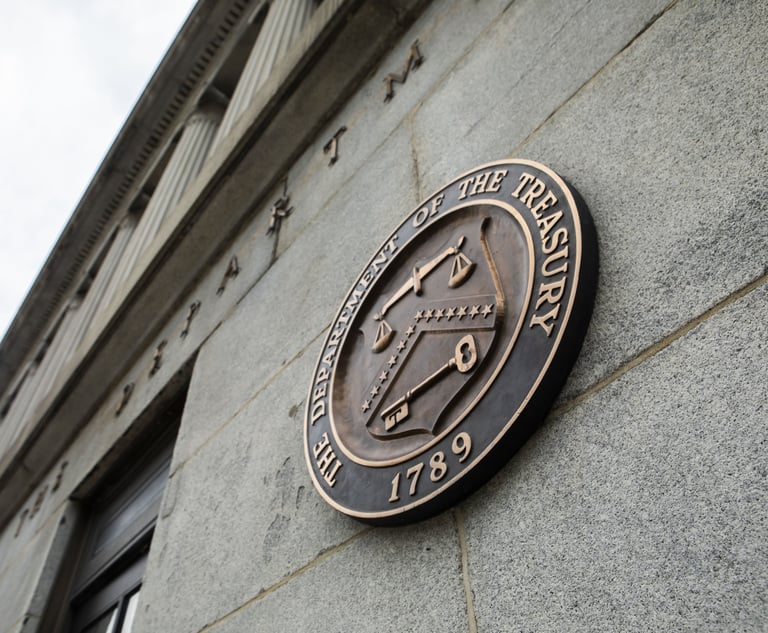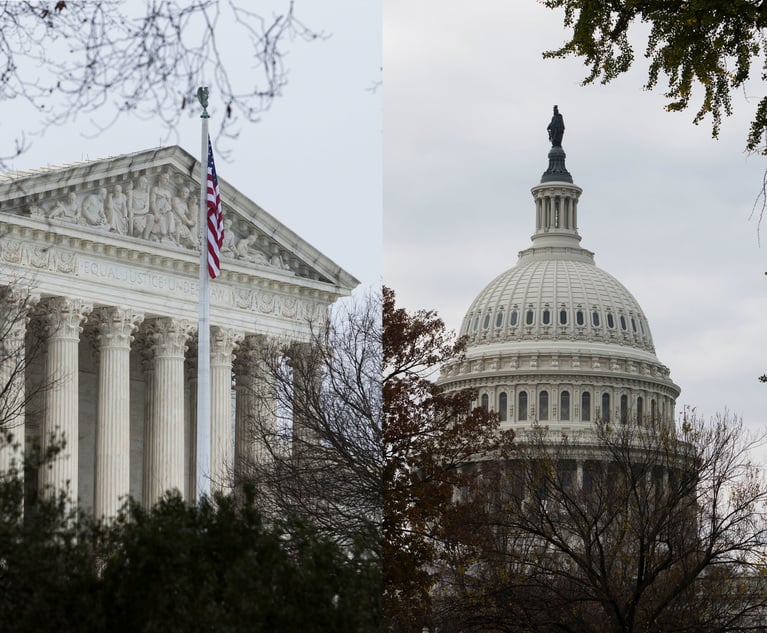 Retired U.S. Supreme Court Justice Stephen Breyer. Photo: Diego M. Radzinschi/ALM
Retired U.S. Supreme Court Justice Stephen Breyer. Photo: Diego M. Radzinschi/ALM Breyer Looks Back on Sexism Faced by Female Harvard Classmates
"They were having a tougher time than we thought," retired Justice Stephen Breyer said of his female peers at Harvard Law School in the early 1960s.
May 16, 2023 at 09:47 PM
4 minute read
Retired U.S. Supreme Court Justice Stephen Breyer recalls thinking it strange that Harvard Law School admitted hardly any women when he began taking classes there in 1961.
"It was weird for me because I grew up in San Francisco and in the West, everything was co-ed," he said in a conversation with George Washington University Law Dean Dayna Bowen Matthew on Tuesday afternoon.
He also said he found it "ridiculous" how the male faculty treated the few women who were in his classes. Still, over 60 years later, Breyer admitted to not fully appreciating at the time how challenging that sexism was for the pioneering female law students in that era before civil rights legislation and the women's liberation movement.
"They were having a tougher time than we thought," Breyer told Matthew as part of a series of talks at GWU on the retired jurist's life and career.
The obstacles faced by the 15 female law students in Breyer's Harvard class of more than 500 people formed the basis of a 2003 book by Judith Richards Hope, who was one of the 15. The book, "Pinstripes & Pearls," features a foreword written by Breyer.
Breyer considered many of the women his friends, and remembered chatting about his classes with them over coffee. He suggested that he didn't realize at the time the effect that some of the male faculty's sexist attitudes had on them.
The dean of Harvard Law School at the time was renowned appellate lawyer Erwin Griswold, who would later serve as U.S. solicitor general. In "Pinstripes" and in the accounts of the late Justice Ruth Bader Ginsburg, who attended HLS a few years earlier, Griswold was known to host a dinner party exclusively for the female law students at which he would ask them individually to explain why they were taking the place of a man at the school. Another professor, Barton Leach, would refuse to ask questions of the female students outside of an embarrassing spectacle he called Ladies Day.
Breyer said he "would think that was funny because it was so ridiculous but if you were one of the [15] women it wasn't so funny."
The retired justice likened the experience of early female law students at Harvard to the pioneers, who settled the remote western frontier in places like Nebraska before they built "superhighways."
"They had a harder time," Breyer said. "It's important to remember that."
As for the faculty members who doled out this unequal treatment, Breyer said the challenge of historians is that the "past is a different country" where "people do things differently." Later in his remarks, he said Griswold was an otherwise upstanding person.
"You have to try to bring yourself to understand the state of mind and the state of mind of Erwin Griswold, Barton Leach and a lot of the faculty was, 'Well, these are all jobs that are going to men, why should a woman have one? Why are you here at Harvard?'"
The challenges of the first female law students didn't end on campus. Ginsburg and Justice Sandra Day O'Connor often spoke about being shut out of lucrative careers in major law firms, forcing them to forge new paths in the law.
O'Connor was even offered a job as a legal secretary at Gibson Dunn despite graduating third in her class at Stanford Law School. She reportedly brought up the slight years later when, as a justice, she was asked to speak at an event celebrating the firm's 100th anniversary.
This content has been archived. It is available through our partners, LexisNexis® and Bloomberg Law.
To view this content, please continue to their sites.
Not a Lexis Subscriber?
Subscribe Now
Not a Bloomberg Law Subscriber?
Subscribe Now
NOT FOR REPRINT
© 2025 ALM Global, LLC, All Rights Reserved. Request academic re-use from www.copyright.com. All other uses, submit a request to asset-and-logo-licensing@alm.com. For more information visit Asset & Logo Licensing.
You Might Like
View All
J.D. Vance Campaign Finance Challenge Leads December Supreme Court Petition Roundup

Corporate Disclosure Law Enjoys ‘Presumption of Constitutionality,’ Feds Tell Justices

Roberts Calls Court's Relationship With Congress 'Strained.' Who's to Blame?

Judicial Conference Declines Democratic Request to Refer Justice Thomas to DOJ
Law Firms Mentioned
Trending Stories
- 1Thinking Outside the RFP: AI’s Impact Beyond Scaling Review Efficiency
- 2Special Series Part 4: The Statutory Guardrails Impermissibly Bind Future Legislatures
- 3New York Court of Appeals Blocks Trump Attempt to Stay Friday Sentencing
- 4'Self-Diagnosed Nickel Allergy' Fails to Find Success in Med-Mal Suit, 8th Circuit Rules
- 5Eversheds Sutherland Adds Hunton Andrews Energy Lawyer With Cross-Border Experience
Who Got The Work
Michael G. Bongiorno, Andrew Scott Dulberg and Elizabeth E. Driscoll from Wilmer Cutler Pickering Hale and Dorr have stepped in to represent Symbotic Inc., an A.I.-enabled technology platform that focuses on increasing supply chain efficiency, and other defendants in a pending shareholder derivative lawsuit. The case, filed Oct. 2 in Massachusetts District Court by the Brown Law Firm on behalf of Stephen Austen, accuses certain officers and directors of misleading investors in regard to Symbotic's potential for margin growth by failing to disclose that the company was not equipped to timely deploy its systems or manage expenses through project delays. The case, assigned to U.S. District Judge Nathaniel M. Gorton, is 1:24-cv-12522, Austen v. Cohen et al.
Who Got The Work
Edmund Polubinski and Marie Killmond of Davis Polk & Wardwell have entered appearances for data platform software development company MongoDB and other defendants in a pending shareholder derivative lawsuit. The action, filed Oct. 7 in New York Southern District Court by the Brown Law Firm, accuses the company's directors and/or officers of falsely expressing confidence in the company’s restructuring of its sales incentive plan and downplaying the severity of decreases in its upfront commitments. The case is 1:24-cv-07594, Roy v. Ittycheria et al.
Who Got The Work
Amy O. Bruchs and Kurt F. Ellison of Michael Best & Friedrich have entered appearances for Epic Systems Corp. in a pending employment discrimination lawsuit. The suit was filed Sept. 7 in Wisconsin Western District Court by Levine Eisberner LLC and Siri & Glimstad on behalf of a project manager who claims that he was wrongfully terminated after applying for a religious exemption to the defendant's COVID-19 vaccine mandate. The case, assigned to U.S. Magistrate Judge Anita Marie Boor, is 3:24-cv-00630, Secker, Nathan v. Epic Systems Corporation.
Who Got The Work
David X. Sullivan, Thomas J. Finn and Gregory A. Hall from McCarter & English have entered appearances for Sunrun Installation Services in a pending civil rights lawsuit. The complaint was filed Sept. 4 in Connecticut District Court by attorney Robert M. Berke on behalf of former employee George Edward Steins, who was arrested and charged with employing an unregistered home improvement salesperson. The complaint alleges that had Sunrun informed the Connecticut Department of Consumer Protection that the plaintiff's employment had ended in 2017 and that he no longer held Sunrun's home improvement contractor license, he would not have been hit with charges, which were dismissed in May 2024. The case, assigned to U.S. District Judge Jeffrey A. Meyer, is 3:24-cv-01423, Steins v. Sunrun, Inc. et al.
Who Got The Work
Greenberg Traurig shareholder Joshua L. Raskin has entered an appearance for boohoo.com UK Ltd. in a pending patent infringement lawsuit. The suit, filed Sept. 3 in Texas Eastern District Court by Rozier Hardt McDonough on behalf of Alto Dynamics, asserts five patents related to an online shopping platform. The case, assigned to U.S. District Judge Rodney Gilstrap, is 2:24-cv-00719, Alto Dynamics, LLC v. boohoo.com UK Limited.
Featured Firms
Law Offices of Gary Martin Hays & Associates, P.C.
(470) 294-1674
Law Offices of Mark E. Salomone
(857) 444-6468
Smith & Hassler
(713) 739-1250










